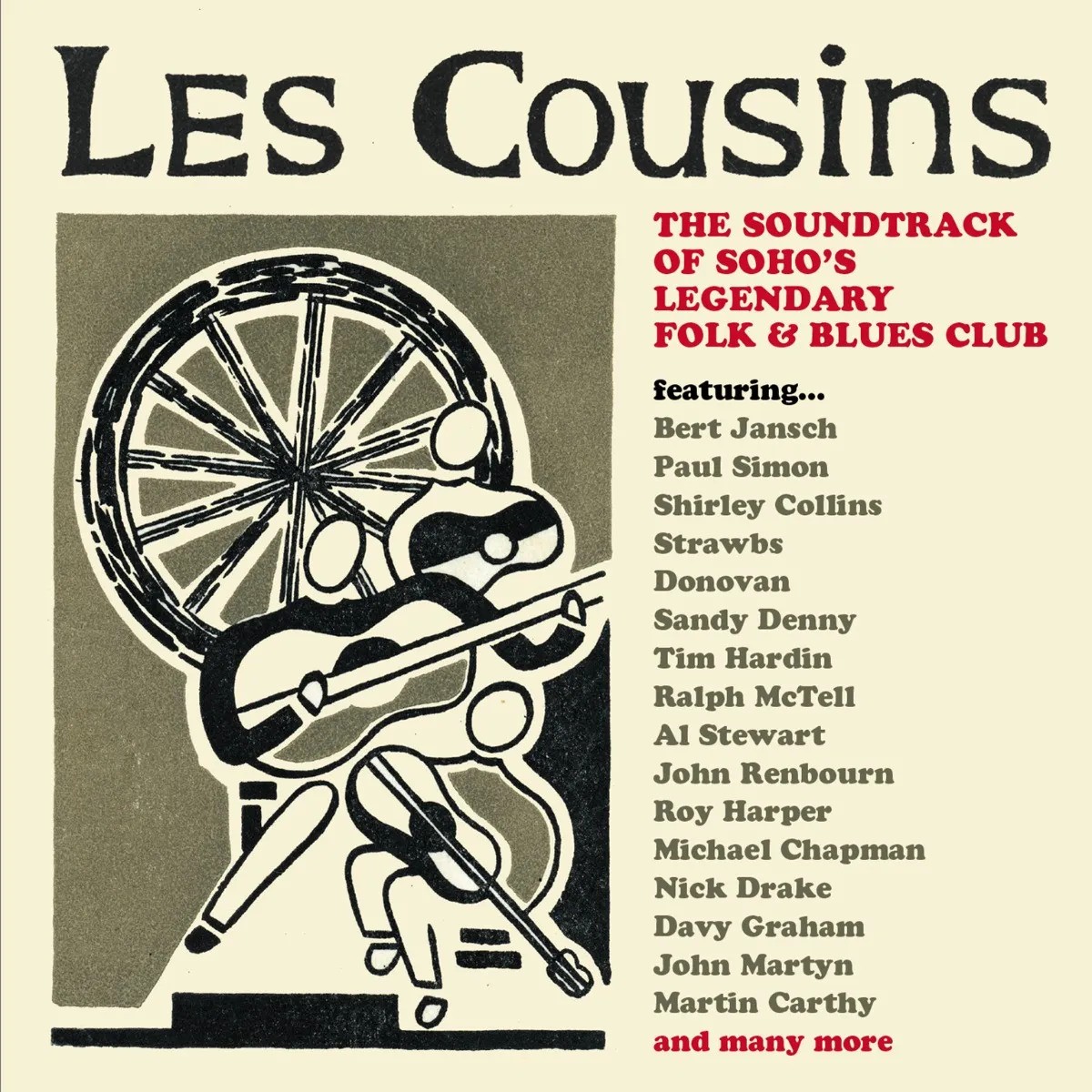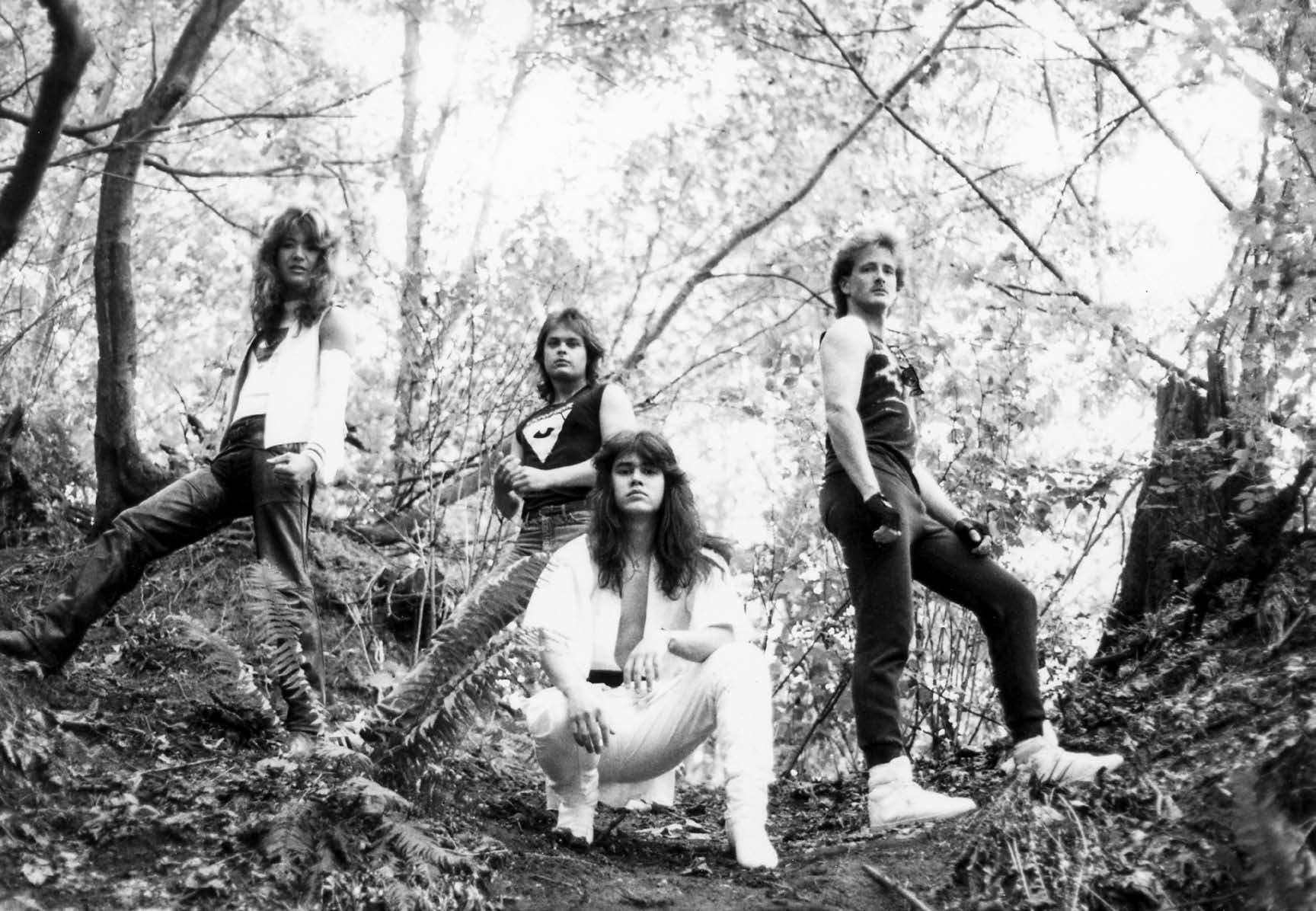Les Cousins – ‘The Soundtrack of Soho’s Legendary Folk & Blues Club’
One of the venues that helped to midwife the folk and blues booms of the 1960s was located at 49 Greek Street in the bohemian Soho area of London’s West End, just around the corner from the Marquee and Covent Garden’s Bunjies.
It opened first as the Skiffle Club around 1956, which was expanded by owners Margaret and Loukas Matheou three years later into the French cuisine of the Soho Grill, the locale being renowned for French poets and anarchists since the 1790s. A change to Greek food as Dionysus in ’67 didn’t affect the ambience.
First a disco, named after Claude Chabrol’s film Les Cousins, the dank cellar refitted and opened as a nightly folk and blues club on Sunday October 4th1964, lacking an alcohol license for a young unrestricted crowd wafting among thick smoke and thinner sandwiches with their coffee. Mostly but not exclusively contemporary acoustic rather than traditional music, though that also featured, it became London’s Greenwich Village coincidentally around the time of Bert Jansch’s trail-blazing Bill Leader-produced debut on Transatlantic—an important label well-featured in this triple CD box—in April 1965.
Al Stewart (who’d been in Tony Blackburn’s beat combo, here has Manuscript from 1970 when establishing his historically-themed folk rock epics) helped to organize and compere thrice-weekly all-nighters, as the nexus of a new scene despite the stage being too small to accommodate drum kits or amplification. One of the first residencies and wide influencers was Bert Jansch, fresh from the Edinburgh scene of 1963 to share a West Hampstead flat with John Renbourn (also tenants were the extravagantly dressed and energetically noisy harmony trio The Young Tradition, here with The Banks Of Claudy 1966). Jansch kicks off the box with the appropriate Running From Home, then duels guitar licks with Renbourn on the impressionistic Soho the following year.
Londoner Renbourn appears with the black American Dorris Henderson a few weeks before his solo (she married one of the Levee Breakers, here with a Parlophone single), and also features with Jacqui McShee before they formed the famous Pentangle when she ran the Red Lion Folk Club in Sutton, where allegedly the Rolling Stones met. Of mixed descent, Gerry Lockran’s Black Girl reworks a Lead Belly song, with Pentangle’s Danny Thompson on bass; he helped found another club at the still extant Half Moon pub in suburban Putney, not far from another key venue the Troubadour in Earls Court from 1966.
Truants from Greenwich Village include Paul Simon, from his CBS debut of 1965, and a trio of Elektra singer songwriters: the influential on such as Dylan yet neglected Spider John Koerner, a 7 or 8 string guitarist for boisterous shows, and the chunky chords of Tom Rush (Joshua Gone Barbados). One is from Jackson C. Frank’s LP, Al Stewart backing with Paul Simon producing, Dave Van Ronk’s ragtime-influenced ’64 debut, Julie Felix on sabbatical from her many television appearances playing covers, and the Woodstock Festival attendee Tim Hardin from Oregon who died from heroin before he was forty (If I Were A Carpenter).
There’s good balance between traditional and modern approaches seasoned by cross-overs. In the former camp around the crackling fire are Shirley Collins (with Notting Hill’s Davy Graham on the widely-covered Nottamun Town; his Maajun (A Taste Of Tangier) highlights his fusion style from a groundbreaking Decca LP of ’65), the legendary Watersons (a Topic album’s Holmfirth Anthem), Anne Briggs (also on Topic, she taught Jansch the song Blackwaterside that was pirated by Page; Sandy Denny and Richard Thompson penned tributes to her, June Tabor says she was her first influence), Hamish Imlach, and the inventor of mock traditional songs A.L. (Bert) Lloyd, here joined by Dave Swarbrick for a song that Jansch made famous, Jack Orion.
From a bevy of pre-fame teeth cutters emerge not only the Incredible String Band (or Incredible String Vest as Peel preferred), the Edinburgh refugees’ second album’s No Sleep Blues, but their co-founder Clive Palmer’s C.O.B., with the classic patchouli of Music Of The Ages from their Ralph McTell-produced debut. McTell (actually Ralph May, Wizz Jones suggested he call himself after the bluesman Blind Willie McTell) appears from a Transatlantic second LP that had his famous Streets Of London. Cat Stevens’ The Tramp, as well as Portobello Road, appear from his 1967 debut on Deram when he lived a few doors away with his Greek Cypriot family; he changes his name more often than an unsuccessful band (in Cousins days he was Steve Adams).
John Martyn (i.e. Ian McGeachy from a North Surrey suburb just up the road from where Sandy Denny was born) sees his pre-experimental debut on Island, whereas Roy Harper is from a much-less known small label album of 1967 before Harvest and befriending their more famous brethren, but like Martyn and Stewart he preferred the burgeoning college circuit to build up their enduring fan bases. Less remembered is Liverpool-born Steve Tilston (another Village Thing disc, with backing group), whose first LP was acclaimed (album of the year in the Daily Mail!) and Rod Stewart bought a box of them for friends.
Classic female singers feature too, such as Sandy Denny from her 1967 debut on the obscure Saga label before fame with Strawbs (here with a cut from their ’69 debut) and Fairport Convention before her untimely death. The track You Never Wanted Me is by her then-boyfriend Jackson C. Frank. Jo Ann Kelly, said to have been invited to join Canned Heat and Johnny Winter, sings Moon Going Down from a sixties CBS album when the touring Mississippi Fred McDowell liked to call her up on stage to duet. She died tragically young in 1990. Beverley is Beverley Kutner, first seen on the cover of boyfriend Bert Jansch’s ‘It Don’t Bother Me,’ from a first recording session circa 1966 with Jimmy Page but unreleased until 2018. She also sings here on the Levee Breakers’ single and was taken not long after to America by Paul Simon, appearing at the Monterrey Pop Festival. After marrying John Martyn, her solo album for Joe Boyd was taken over by her husband and she semi-retired (the anti-John slant of the booklet is one-sided).
Other singers include the highly-rated Shelagh McDonald, who disappeared in 1972 before re-emerging a decade ago, Shirley Collins (a field-researcher of folk heritage in the 1950s with Alan Lomax), Anne Briggs, Maddy Prior with Tim Hart from the St. Albans scene run by Mick Softley before fame with Steeleye Span that included Martin Carthy (Byker Hill from the ’67 Fontana LP with Dave Swarbrick) and Bridget St. John before her three Dandelion albums when she became the first one signed to that renowned label prior to emigrating to New York. The example has Ron Geesin on guitar, who is also here.
Michael Chapman’s No Song To Sing from ‘Rainmaker’ on Harvest is a pleasure to hear again, and that seminal label from the same year is also represented by Third Ear Band’s Alchemy, counterculture ever-presents who performed in Hyde Park free concerts organized by their agency who numbered Pink Floyd, along with Kevin Ayers whose Eleanor’s Cake (Which Ate Her) reminds of his Soft Machine roots for this ’69 debut. Another innovator is Mike Cooper, whose Pye albums are absolute period classics. The then-unknown Nick Drake’s Northern Sky brings back period bedsits, segued with the Sallyangie that saw Mike Oldfield and sister Sally years before his big-selling ‘Tubular Bells’ added to Virgin’s stash.
Hit makers include Donovan (Sunny Goodge Street) but his inclusion from the time of the St. Albans folk scene highlights an omission that shouldn’t really be, that of Mick Softley, a couple of whose songs were taken without permission by the starman. (Similarly, Hamish Imlach and Alex Campbell but no firebrand Ewan MacColl, no Gordon Giltrap or Michael-Claire, but completism is unattainable of course.) A chart regular was Alexis Korner (from a Liberty ’68 LP) who also is on Long John Baldry’s Gee Baby Ain’t I Good To You (1964), and the surprising top ten hits of one-man band and theatre-queue busker Don Partridge (Rosie).
If ever there was a legend left behind by supportive big labels it was Wizz Jones, here on Ian A. Anderson’s Village Thing label from Bristol. He busked worldwide and was part of most scenes as a kind of Beatnik guru. Many famous names cite his influence and has been widely covered (e.g. by Bruce Springsteen). Maybe Keith Christmas or Duffy Power fit that ham-strung category here as well. The former was in the Bristol Troubadour scene when at university and went on to play on Bowie’s ‘Space Oddity’ and tour support the Who. His B&C album’s title track ‘Fable Of The Wings’ is representative. Duffy Power (i.e. Ray Howard) was one of the country’s best blues and R&B singers from the 50s, with Alexis Korner as a close mentor though Duffy suffered from mental issues most of his life. His track comes from the same compilation as Hawaiian-influenced Sam Mitchell’s Leaf Without A Tree (Firepoint, Spark) who’s on Rod Stewart’s early solo LPs.
Obscure but interesting surprises include Al Jones (one album on Parlophone), the ragtime master John James who worked with Renbourn, and Derrol Adams, who played at the venue when it was the Skiffle Club, on Village Thing from 1972. His anti-war Portland Song (not here) became a staple in his native America; moving to Belgium he became important in European folk, as did Northerner Tom Yates who recorded for CBS and President when befriending Paul Simon and Duncan Brown before moving to Antwerp until his death in 1993. Village Thing labelmate Dave Evans (Grey Lady Morning) shared earthy stories from round the world as a sailor accompanied by a ringing self-made guitar with unusual tunings. Owen Hand was an ex-miner and soldier from Edinburgh who recorded a second album for Transatlantic at 32; his debut had showcased Tom Paxton’s songs. Like Dave Ellis on a well-reviewed Sonet LP, Andy Fernbach had high hopes when recording with Liberty, but it was his only one and he retired to build a studio. Nadia Cattouse was from Belize, her father a deputy Prime Minister, and though her third platter was on RCA (‘Earth Mother’), produced by Sandy Robertson with covers of Dylan, Andy Roberts and Sydney Carter (composer of Lord Of The Dance) she drifted into acting on such as Dixon Of Dock Green instead.
Despite the basic sound, a smattering of bands gave their all there. Leading Irish neo-folkers before the term was coined were Sweeney’s Men (the classic Reynard The Fox) embryo for such as Planxty and the Pogues, the erudite whimsy of Dr. Strangely Strange’s Island debut, the grossly neglected Dando Shaft’s debut on Neon as if sent to Coventry from where they formed—always closer to Trees than Pentangle—and the collectible swinging sixties of Piccadilly Line, a duo who doubled as Al Stewart’s backing band. Welcome is Ian A. Anderson’s Country Blues Band on Liberty, indefatigable in the Bristol scene and founder of Village Thing Records. His knowledgeable introduction adorns this compilation. Venue bootlegs have surfaced over the years (e.g. of Dr. Strangely Strange) but none are used here.
On the third CD appear the incongruously-named trio Mudge & Clutterbuck (a Saydisc EP) from the west country, who were very nearly signed by Joe Boyd, the male-female traditionalist duo Dave & Toni Arthur from a ’67 Leader-produced debut, Toni becoming a presenter of children’s television shows like Play School, and the McPeake Family (Topic, 1963), an Irish clan who penned classics in that country’s repertoire as far back as the 1940s and packed the Albert Hall. Better known to folk/country rock fans are Plainsong with Old Man At The Mill of 1972. Formed by Iain Matthews, who’d struck gold with Southern Comfort’s cover of Joni Mitchell’s Woodstock following the musical chairs of Fairport Convention, and Andy Roberts, a stalwart of the Liverpool Scene and working unsung on most Beatles albums alongside an army of extras. Low sales of Plainsong’s debut led to the follow-up being aborted until a recent Cherry Red box set.
In April 1972 the club finally closed its doors, but this three CD box curates a new trip, as if those bygone rooms and corridors mingled with blooms converse together about mutual memories. Well-illustrated with photo portraits and period diary pages (the original microphone in its velvet box on the booklet cover is a nice touch), an echo of a vibrant scene captivates new and older listeners alike for what was a magical microcosm of culture.
Brian R. Banks
Les Cousins – ‘The Soundtrack of Soho’s Legendary Folk & Blues Club’ (Cherry Red Records)




